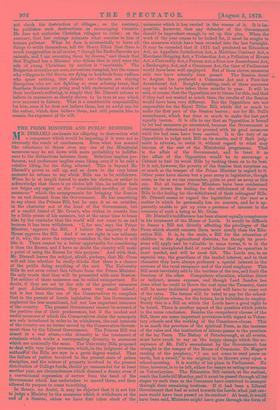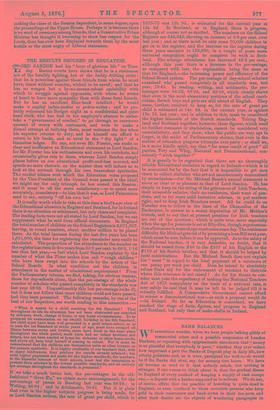THE PRIME MINISTER AND PUBLIC BUSINESS.
Ar. DISRAELI condemns his offspring to destruction with a composure which would be imposing, if it were not so obviously the result of carelessness. Even what has seemed like reluctance to throw over any one of the Ministerial measures may be set down with more probability to indiffer- ence to the distinctions between them. Selection implies pre- ference, and preference implies some liking, even if it be only a relative liking, for the thing selected. This is beyond Mr. Maraeli's power to call up, and so down to the very latest moment he refuses to say which Bills are to be withdrawn. When he is at length forced to make his choice, or rather to acknowledge that there is no choice left him, he neither feels nor feigns any regret at the "considerable sacrifice of those measures" which the arrangements for bringing the Session to an end demand from the Government. He has something to say about the Prisons Bill, but he says it as an outsider, in the character not of the head of the Government, but of a candid friend of Mr. Cross's, who wishes to console him by a little praise of his measure, but at the same time to brace him by the reminder that the world will not come to an end because it has been withdrawn. 'I, for one,' says the Prime Minister, 'approve the Bill. I believe the majority of the House approve the Bill. And if we are right in our estimate of it, why, the more the country considers it, the better it will like it. There cannot be a better opportunity for considering it than the Recess, and I have no doubt the country will make a point of using the Recess for this purpose.' And with that, Mr. Disraeli leaves the subject, afraid, perhaps, that Mr. Cross will ask him whether he really thinks that there is a chance of the public doing anything of the sort. The University Bills do not even extort this tribute from the Prime Minister. He only trusts that they will be proceeded with next Session. Yet neither of these measures can be called unimportant. No doubt, if they are set by the side of the greater measures of past Administrations, they seem very small indeed ; but it has been the cue of the Conservatives to complain that in the pursuit of heroic legislation the late Government neglected the less sensational, but not less important interests of the country. The present Government cannot be accused of the positive sins of their predecessors, but if the modest and useful measures of which the Conservatives claim the monopoly are only introduced in order to be withdrawn, the real interests of the country are no better served by the Conservative Govern- ment than by the Liberal Government. The Prisons Bill was aimed at a real abuse,—the diversity in the treatment of criminals which works a corresponding diversity in sentences which are nominally the same. The University Bills proposed to deal with very large revenues, which, in the judgment of the author#Of the Bills, are now in a great degree wasted. That the failure of justice involved in the present state of prison discipline, and the misuse of property involved in the present distribution of College funds, should go unamended for at least another year, are circumstances which demand a decent even if a conventional expression of sorrow from the head of the Government which has undertaken to amend them, and then allowed its purpose to come to nothing. In theory, no doubt, it may be objected that it is not fair to judge a Ministry by the measures which it withdraws at the end of a Session, unless we have first taken stock of the measures which it has carried in the course of it. It is im- possible, however, that any defender of the Government should be imprudent enough to set up this plea. When the work of the year comes to be looked for, it must be sought in the measures which have been crowded into the last fortnight. It may be conceded that if 1875 had produced an Education Act, an Appellate Jurisdiction Act, a Maritime Contract Act, a Merchant Shipping Act, a Vivisection Act, a Pollution of Rivers Act, a University Act, a Prisons Act, a Poor-law Amendment Act, a Bankruptcy Act, and a Commons Act, the time of Parliament would have been well employed. But of these eleven measures only two have actually been passed. The Session down to August has produced a Commons Act and a Poor-law Amendment Act. Roughly speaking, each of these measures may be said to have taken three months to pass. It will be said, of course, that the Opposition are to blame for this, and that if they had not wasted so much time, the results of the Session would have been very different. But the Opposition are not responsible for the Royal Titles Bill, which did so much to make the first part of the Session barren ; nor for Mr. Pell's amendment, which has done so much to make the last part equally barren. It is idle to say that an Opposition is bound to let bad measures go unresisted, because the Government is obstinately determined not to proceed with its good measures until the bad ones have been carried. It is the duty of an Opposition to judge each Bill on its merits, and if their judg- ment is adverse, to resist it, without regard to what may become of the rest of the Ministerial programme. That is the affair of the Government, and to treat it as the affair of the Opposition would be to encourage a Cabinet to bait its worst Bills by tacking them on to its best. It is not, however, the poverty of the Session that surprises us, so much as the temper of the Prime Minister in regard to it. Other years have shown but a poor array in legislation, though none, so far as we can remember, quite so poor an array as this one. But all former Prime Ministers have been condemned alike to drown the feeling for the withdrawal of their own Bills in the feeling for the withdrawal of their colleagues' Bills. Mr. Disraeli seems to regard the legislation of the year as a matter in which he personally has no concern, and he is ap- parently unable to get up even a pretence of interest in the concerns of such a being as Mr. Cross.
Mr. Disraeli's indifference has been almost equally conspicuous in his treatment of the House of Lords. It would be difficult to frame a Bill not directly affecting the privileges of the Peers which should concern them more nearly than the Edu- cation Bill. It is, in the main, a Bill for the education of children in the Agricultural districts, for though its provi- sions will apply and be valuable in some towns, it is in the great and unexplored field of rural labour that its operation is most needed, and will be most felt. The Lords are, in an especial way, the guardians of the landed interest, and in that character they have always professed a special interest in the sorrows of the rural ratepayer and of the rural employer. This Bill must inevitably add to the burdens of the one, and limit the freedom of the other. Compulsory education, whether direct or indirect, means expense, and though Lord Sandon has done what he could to throw the cost upon the Treasury, there will be many incidental payments that will have to come out of the rates. The farmer will be rated to pay for the school- ing of children whom, for the future, he is forbidden to employ. Surely this is a Bill on which the Lords have a good right to be heard. There is another aspect of the question which points to the same conclusion. Besides the compulsory clauses of the Bill, there are some important provisions with regard to Volun- tary schools and the working of the Conscience-clause. This is as much the province of the spiritual Peers, as the increase of the rates and the institution of labour-passes is the province of the lay Peers. The Bishop of Peterborough, at all events, must have much to say on the happy change which the ac- ceptance of Mr. Poll's amendment by the Government has wrought in the temper of the House of Commons. Dr. Magee's reading of the prophecy, "I am not come to send peace on earth, but a sword," is too original to be thrown away upon a school-meeting. It is worthy of his place in Parliament. No time, however, is to be left, either for essays on rating or sermons on Voluntaryism. The Education Bill cannot, at the earliest, reach the Lords till Monday, and it must be passed through all ibis stages by such time as the Commons have contrived to scamper through their remaining business. If it had been a Liberal Government that had so acted towards the Lords, what just cen- sure would have been passed on its conduct! At least, it would have been said, Ministers might have gone through the form of making the close of the Session dependent, in some degree, upon the proceedings of the Upper House. Perhaps it is because there is no need of ceremony among friends, that a Conservative Prime Minister has thought it becoming to show less respect for the Lords, than has ever been displayed towards them by the most hostile or the most angry of Liberal statesmen.































 Previous page
Previous page